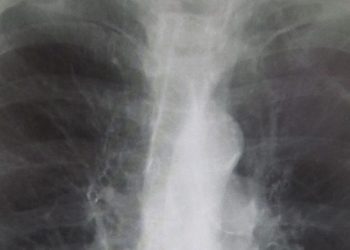Indacaterol/glycopyrronium superior to salmeterol/fluticasone in reducing annual COPD exacerbations: The FLAME Study
1. Indacaterol/glycopyrronium significantly reduced annual COPD exacerbation rates as compared to standard therapy with salmeterol/fluticasone.
2. The adverse events and deaths were similar across both groups.
Evidence Rating Level: 1 (Excellent)
Study Rundown: Frequent COPD exacerbations are associated with reduced quality of life, mortality and increased hospital costs, thus regimens to reduce exacerbations are important. Guidelines suggest that those with frequent exacerbations should use inhaled long acting glucocorticoids and long acting beta-agonists (LABA). However, the alternative of a LABA and a long-acting muscarinic antagonist (LAMA) also exists. Given potential side effects from long-term use of inhaled glucocorticoids, the efficacy of the LABA/LAMA combination as compared to standard of care is unclear. This randomized controlled trial aimed to determine if the LABA indacaterol and LAMA glycopyrronium were at least as effective as the LABA salmeterol and the inhaled glucocorticoid fluticasone.
The LABA/LAMA combination of indacaterol/glycopyrronium was not only noninferior but also superior to standard of care. The LABA/LAMA group also had longer time to first exacerbation in all severities of COPD exacerbation. The incidence of adverse events and deaths were similar in both groups. However, the incidence of pneumonia (a presumed side effect from long-term inhaled glucocorticoids) was statistically higher in the salmeterol/fluticasone group. Limitations of this study include its per-protocol analysis for the primary outcome and pharmaceutical company involvement in trial design and reporting.
Click to read the study, published today in NEJM
Relevant Reading: Salmeterol and Fluticasone Propionate and Survival in Chronic Obstructive Pulmonary Disease
In-Depth [randomized controlled trial]: The FLAME trial was a multi-centre, randomized, double-blind, double-dummy, parallel-group, non-inferiority trial. Patients were 40 or older, with grade 2 or higher COPD on the MRC scale, had a post-bronchodilator FEV-1 of at least 25% to <60% of predicted value. Patients also must have had a COPD exacerbation in the year previous to enrollment. After a 1-week long run-in period with tiotropium (18μg), patients were randomly assigned in a 1:1 ratio to receive indacaterol (110μg) plus glycopyrronium (50μg) once daily or salmeterol (50μg) plus fluticasone (500μg) twice daily for 52 weeks. They were followed for an additional 30 days after regimen discontinuation. All patients had access to open-label salbutamol (100μg) as a rescue medication. The primary objective of this trial was to show that the LABA/LAMA combination would be non-inferior to LABA/Inhaled glucocorticoids in reducing the rate of COPD exacerbations. The safety of both treatment regimens was analyzed.
A total of 1680 patients were assigned to LABA/LAMA and 1682 to LABA/inhaled glucocorticoid. Indacaterol/glycopyrronium was not only noninferior but also superior to salmeterol/fluticasone in reducing annual COPD exacerbation rate. There was an 11% reduction in the LABA/LAMA group as compared to LABA/inhaled glucocorticoid (3.59 vs. 4.03; RR=0.89, 95% [CI], 0.83-0.96, p=0.003). There was a longer time to first COPD exacerbation in all severities in the LABA/LAMA group (71 days vs. 51 days; HR=0.84, 95% [CI]: 0.78-0.91; P<0.001). There was no difference in adverse events or mortality across the two treatment regimens. The only difference was an increased incidence of pneumonia in the salmeterol/fluticasone group (3.2% vs. 4.8%; p=0.02)
Image: PD
©2016 2 Minute Medicine, Inc. All rights reserved. No works may be reproduced without expressed written consent from 2 Minute Medicine, Inc. Inquire about licensing here. No article should be construed as medical advice and is not intended as such by the authors or by 2 Minute Medicine, Inc.





